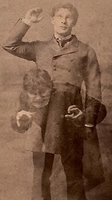 Mind Hacks has an interesting post on a recent paper by English Professor Anne Stiles about the influence of 19th century neurological research on Bram Stoker's depiction of Dracula. The post points to a transcript of Stiles' appearance on Australian Broadcasting Company Radio's All in the Mind. In that interview she discusses both Dracula and The Strange Case of Dr. Jekyll and Mr. Hyde. What I find particularly interesting is the evidence that both Stevenson and Stoker were familiar with the current scientific literature and incorporated that knowledge into their works.
Mind Hacks has an interesting post on a recent paper by English Professor Anne Stiles about the influence of 19th century neurological research on Bram Stoker's depiction of Dracula. The post points to a transcript of Stiles' appearance on Australian Broadcasting Company Radio's All in the Mind. In that interview she discusses both Dracula and The Strange Case of Dr. Jekyll and Mr. Hyde. What I find particularly interesting is the evidence that both Stevenson and Stoker were familiar with the current scientific literature and incorporated that knowledge into their works.Natasha Mitchell: What do you know - because you went searching for evidence to see if Robert Louis Stevenson has actually been reading some of the scientific literature around the double brain of the time -how do you know that all these debates he actually informed his character?Stiles' recent paper in the Journal of the History of the Neurosciences expands on Stoker's contemporary neuroscience knowledge:
Anne Stiles: I suspect they did because his wife was writing in an introduction to one of his later works that he was inspired to write Jekyll and Hyde by an article in Revue Scientifique which was a French psychological journal and then I found those same studies described again in Cornhill Magazine which was a publication that Stevenson himself was contributing to during the same time periods so the late 1870s. And so I think these articles on two particular case studies could not possibly have escaped Stevenson's notice since they were writing in the same periodical.
Stoker came from a family of distinguished Irish physicians and obtained an M.A. in mathematics from Trinity College, Dublin. His personal library contained volumes on physiology, and his composition notes for Dracula include typewritten pages on somnambulism, trance states, and cranial injuries. Stoker used his knowledge of neurology extensively in Dracula.Both authors used their knowledge to comment on the human condition. As Stiles concludes:
I suggest that Stoker's vampire protagonist dramatizes the pervasive late-nineteenth-century fear that human beings are soulless machines motivated solely by physiological factors.I believe that same fear is held by many people today, which is why these stories resonate with contemporary audiences more than a century after their original publication.
• Download pdf of Strange Case of Dr. Jekyll and Mr. Hyde
• Download pdf of Dracula
Photo: Part of ~1895 portrait of Henry Van der Weyde, star of the London stage version of Dr. Jekyll and Mr. Hyde. From the American Museum of Photography.
Tags:horror, neuroscience, Bram Stoker, Dracula, Robert Louis Stevenson, Dr. Jekyll and Mr. Hyde




No comments:
Post a Comment
I've turned on comment moderation on posts older than 30 days. Your (non-spammy) comment should appear when I've had a chance to review it.